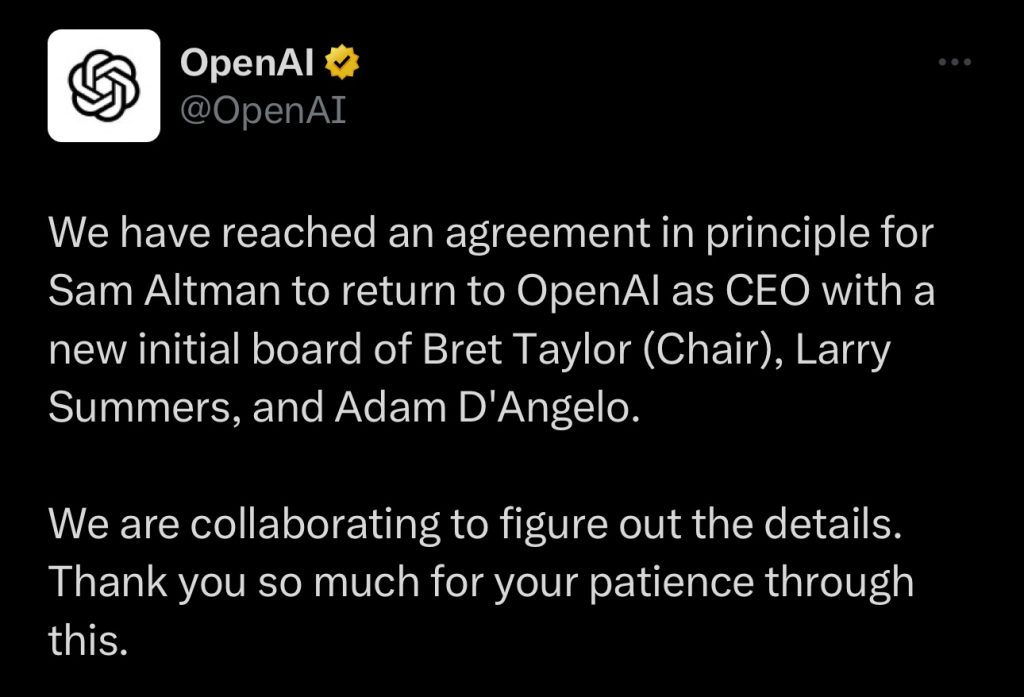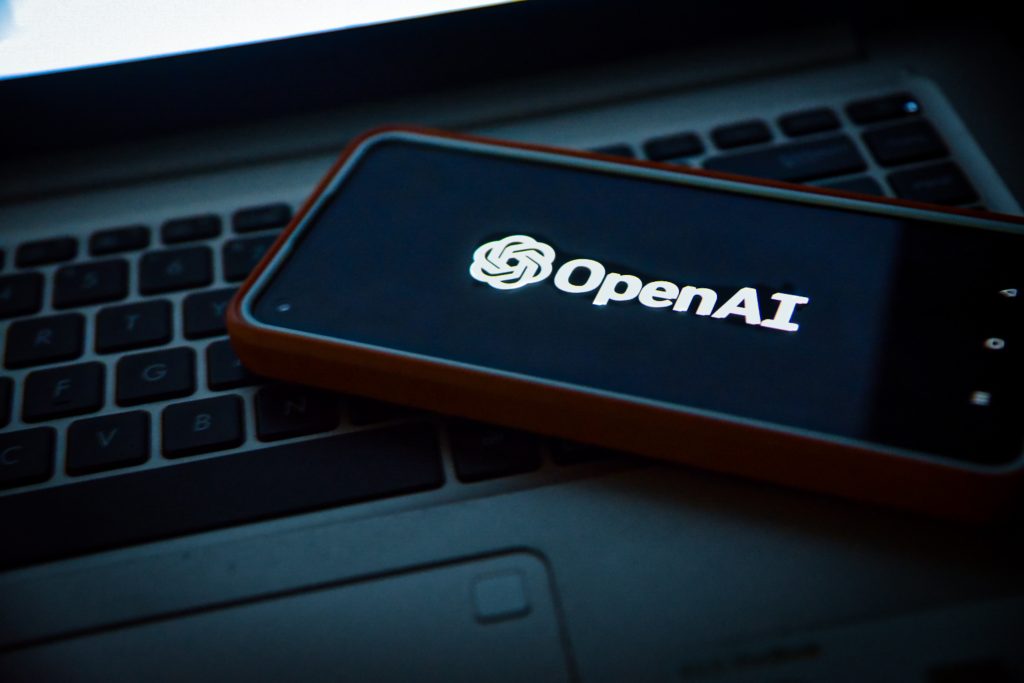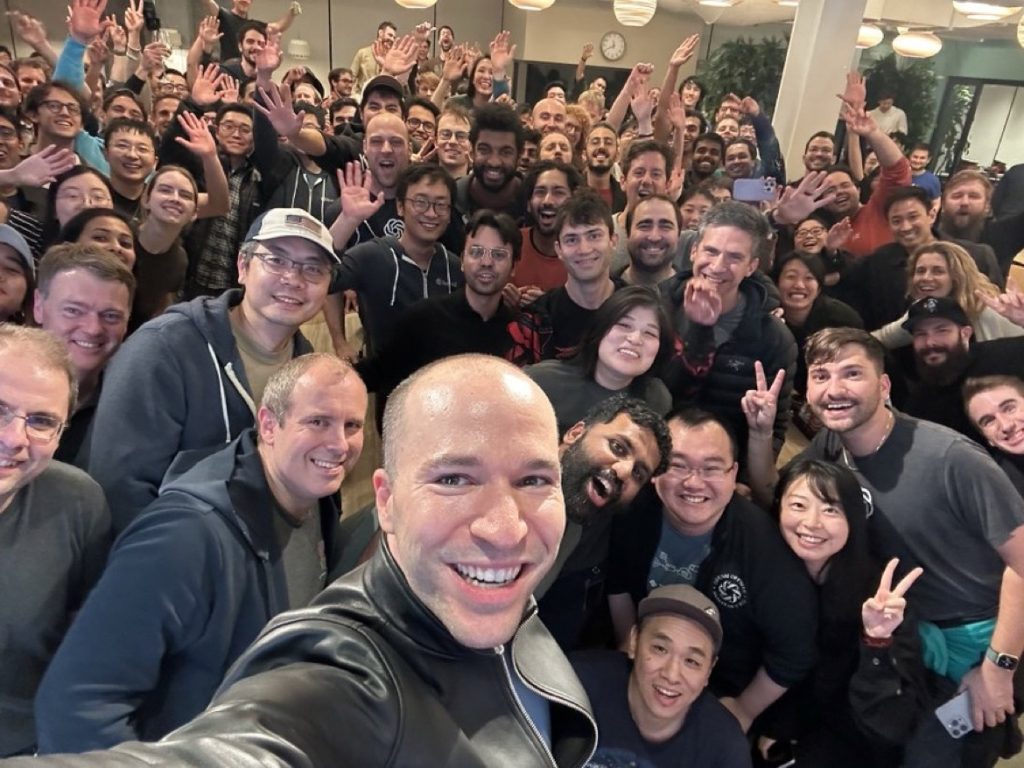In a dramatic about-face after an unexpected leadership shakeup, OpenAI, a leading artificial intelligence research organization, has reinstated Sam Altman as CEO. The return comes on the heels of a series of intense negotiations following Altman’s abrupt dismissal by the previous board last Friday. At around 1 a.m. Eastern Time on Tuesday, the company announced an agreement “in principle” delineating the new trajectory for OpenAI’s governance, which sees Altman regaining his position and the introduction of an “initial” Board of Directors.

The new board members, whose roles are to be considered transitional at this stage, include notable figures such as Bret Taylor, former co-CEO of Salesforce, who will act as chairman; Adam D’Angelo, CEO of Quora and a returning member from the old board; and, in a surprising selection, economist Larry Summers. This new board composition promises a mix of tech insight and wide-ranging policy expertise as OpenAI endeavors to navigate the increasingly complex landscape of AI governance and ethical scrutiny.
Bret Taylor’s appointment as chair of the initial board comes amidst speculation. His involvement with OpenAI has gained traction in industry conversation, signaling the kind of leadership the organization is seeking. Adam D’Angelo’s continued presence suggests stability and consistency from the prior board, potentially lending some continuity during the forthcoming transitions.

Larry Summers’ presence, however, adds an interesting dimension. As a politician and economist who held key roles during pivotal economic periods such as serving as the U.S. Secretary of the Treasury under President Clinton, and directing the White House National Economic Council under President Obama, Summers strikes a figure of vast experience and political acumen. His expertise, particularly in economic policy, will presumably be a valuable asset for OpenAI, which is grappling with intense scrutiny and the intricate balance between technological advancement and regulatory responsibility.
In the backdrop of these board member appointments, stands the interim period overseen by Emmett Shear, who stepped in briefly as CEO, and Mira Murati, OpenAI’s Chief Technology Officer. Although their tenures were short-lived, the impact of their decisions, as evidenced by Shear’s tweet, was in the interest of maximizing safety and addressing stakeholder concerns.
The underlying dynamics of this restructuring imply several things. First, it highlights the transitional nature of the current board – this is but a step toward a more permanent makeup rumored to eventually include nine members, with names such as Altman himself, and potentially a Microsoft executive. Microsoft’s involvement is particularly noteworthy given its existing relationship with OpenAI, and rumors that the company had been considering pushing for board representation prior to this “breakthrough.” Such a move could invite further regulatory scrutiny, but Microsoft’s leadership appears supportive of this governance evolution, with CEO Satya Nadella tweeting commendation for the board changes.
Furthermore, this restructuring carries implications for Ilya Sutskever, OpenAI’s chief scientist and co-founder, who has reportedly lost a significant degree of influence following these changes. Also noteworthy is the departure of tech entrepreneur Tasha McCauley and Helen Toner, director at Georgetown’s Center for Security and Emerging Technologies, the latter of whom was reportedly in conflict with Altman over OpenAI’s safety practices.
As for Greg Brockman, OpenAI’s president who resigned following Altman’s initial exit, it’s uncertain in what capacity he’ll be “returning to OpenAI,” as he hinted at in a tweet. With no mention of his reappointment in the recent announcement, his future role within the company remains an open question.

In conclusion, it’s evident that OpenAI is undergoing a significant transition that reflects the complex challenges of AI governance. The establishment of a new board featuring industry veterans and policy experts alludes to the multifaceted strategy OpenAI is undertaking to stride forward. As we await further details on the final composition of the board and the organization’s strategic direction, one thing remains clear: OpenAI continues to evolve as it cements its place at the forefront of AI research and development, with governance and oversight never far from the spotlight.



